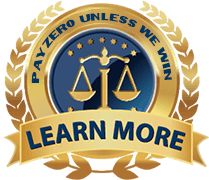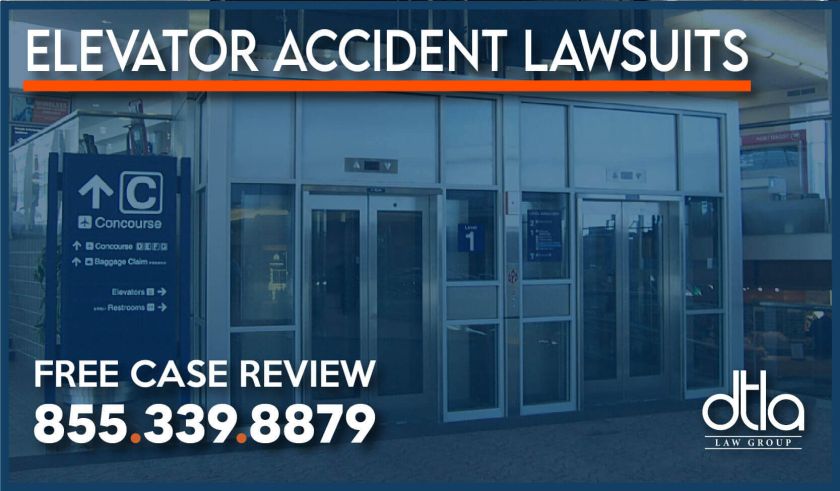Elevator Accident Lawsuits
Elevators allow us to move between floors in buildings without the need of using the stairs, something that has proven useful for the disabled as well as the elderly – parties who should not be using the stairs. Even parties who are physically able to use stairs to go up and down floors often choose the elevator simply because of its convenience. Elevators in business districts and cities across the state of California are used by office workers, homemakers, employees, and others as a mode of transportation up and down buildings. Every year, Americans use an elevator more that 120 billion times in various buildings including shopping centers and malls, office buildings, housings, and supermarkets. Elevators have essentially become part of our everyday lives. Many of us are even annoyed at the inconvenience that out-of-order elevators represent in our normal routines. Although the convenience of elevators is undeniable, the fact that elevators can cause severe harm is also undeniable. Elevator accidents can occur at any time – and can result in devastation. Did you suffer an accident in an elevator? Did you or a member of your family suffer any sort of harm in direct association with an elevator? If so, you might have grounds to pursue legal action for the harm that you suffered. Here at the Downtown LA Law Group, we understand how frightening an elevator accident can be. When you contact our firm, an experienced Personal Injury Attorney will take the time to hear the facts and determine the optimal legal course of action so that you can be fully compensated for your loss. When you contact our law firm and allow our experts to handle your claim, you can be certain that there will always be someone aggressively fighting for your rights. If you would like to discuss your elevator injury claim with the elevator accident lawyers at our law firm, do not hesitate to contact Downtown L.A. Law Group as soon as possible – we are ready to provide you with the guidance that you need to reach a successful claim outcome.
Who Can Be Held Liable for and Elevator Injury ClaimWho can be at-fault for the harm that you suffered in an elevator accident? In general, there are three separate parties that could be at-fault depending on the specific details of the incident. These parties generally include the owner of the property in which the elevator is located, the company that manufactured the elevator, and the company that is in charge of elevator maintenance and repair. Consider the following information regarding each of these parties:
- The property owner has a specific duty of care to ensure that their entire property is free of any hazards. Because elevators are located in their property, they have the duty to ensure that their elevators are safe. They must ensure that their elevators receive routine maintenance and are repaired when necessary. Any time that they breach their duty of care (i.e. fail to repair or maintain the elevators, or fail to warn others of the hazardous elevator), they are putting innocent parties at risk of suffering harm.
- The company that manufactured the elevator also has a specific duty of care to consumers and to ensure that their elevators are completely free of any hazards. They must subject their products to thorough inspections and tests to ensure that they are completely safe for their intended use. If there is a defect in the product’s manufacturing, design, or labeling, the company is putting innocent parties at risk of suffering harm.
- The company that maintains and repairs the elevator also has a specific duty of care that could make them liable for any harm suffered. Specifically, these companies have to ensure that their staff members are skilled enough to handle the difficult task represented by maintaining and repairing elevators. Unskilled employees could fail to repair elevators correctly and can even cause additional problems. These companies also have to ensure that their employees have the appropriate safety training required to work on elevators. Failing to ensure that their employees are skilled and knowledgeable on safety guidelines can put employees and other parties at significant risk of suffering harm.
Closing – Rapidly Closing Elevator Door Accidents
We are sure you have never thought about it carefully, but it takes a lot of machinery to work properly for an elevator door to open and close safely. The elevator door works on a series of gears, pulleys, magnets, sensors, belts, wheels, arms, nuts, bolts, door panels and levers to allow the door to open safely every day.
Elevator Logic Is More Complicated Than What You Would Think
It is worth it to explain the rudimentary description of how an elevator door works. So, sit back and prepare to get your electrical and mechanical engineering license, at this point! First and foremost, there is no one type of elevator, and neither is there only one type of elevator door. Elevator doors can open from one side (slide side door), or part each way from the center of the door (center parting door). Fun fact: on all elevator doors there is a hoistway door or hatch door that runs with the elevator at each floor, that opens and closes at the same time that the elevator car door opens and closes. The sole purpose of the hatch door is to keep people from falling down into the elevator shaft when the elevator car is not on the right floor to pick you up! You’ll notice this double door when you get into an elevator again, we promise.
Next, it is important to understand that the elevator is controlled by an electrical impulse that is emitted from the elevator controller, telling the door when it is called to a floor, when to open the doors, or to close the doors, as well as how to stop precisely at the right place to allow you to get into the elevator properly on a level base when the elevator stops. On top of the door are levers to open and close the door, there are sensors to stop closing if someone is in the way of the door closing to stop that action, and there are wheels and pulleys along the door to slide it open and closed smoothly.
Injuries from Lack of a Censor and Other Low Maintenance on an Elevator Door
A person can be seriously injured quite easily from a broken elevator door. What with all the moving parts, gears, belts, sensors and pulleys, only one facet of the elevator door has to be misaligned, out of whack, not greased or properly maintained or mishandled and the whole elevator door can become a death vise for someone stuck in its path. These parts break down frequently, and for that reason elevator doors need to be carefully maintained. The maintenance department of the building where the elevator is housed is responsible for keeping the elevators in top working order. This is a supreme matter of public safety. Besides the sensors, what can break down in an elevator includes:
- Wheels
- Linkages
- Tracks and sills can have debris
- Rollers
- Gibs
- Belts
- Pulleys
- Magnets
- Brushes
- Door interlocks
- Door panels
- Door linkage
- Door clutch
- Door restrictor
- Gate switch
- Door locks
- Door motor
- Microprocessor control system
- Door weights
- Infrared electronic sensing device
- Rollers
Our Recent Verdicts and Settlements
$1.96 Million
$600,000
$825,000
$500,000
$500,000
$460,000
$420,000
$525,000
In the case of harm, the parties listed above could be held accountable. In many cases, liability can be shared among two or more of the parties listed above. If you would like to learn more about the parties that could be liable for the elevator injuries that you or your family suffered, do not hesitate to contact our law firm as soon as possible – you might have grounds to file a claim and fight for your right to be compensated.
Common Injuries Resulting from Elevator AccidentsWhat type of harm is usually associated with elevator accidents? Elevator accidents have the potential to cause significant harm when victims least expect it. Some of the most common harm caused by elevator accidents includes the following:
- Broken bones
- Shoulder injuries
- Neck and back injuries
- Facial Injuries
- Spinal cord injuries
Regardless of the specific harm that you suffered, it is important that you seek immediate medical attention. If you delay your treatment, your condition might worsen. Undeniably, you and your family are likely to be left dealing with expensive medical bills. Your expensive medical bills might motivate you to seek monetary compensation by filing a lawsuit.
How do I protect myself from an elevator accidentWithout a doubt, one should always use caution when entering or exiting an elevator, also one should always ensure that the elevator is where it should be before stepping forward (to avoid stepping into and falling into an empty elevator shaft). Other tips include watching your step when going into or going out of an elevator since it is likely that the elevator is not completely level as it should be. Most importantly, we should never use an elevator if there is a fire (even if we cannot see a physical fire and can only hear a fire alarm). Although many of us have never experienced a severe accident in an elevator, many of us have found ourselves stuck in a non-functioning elevator at some point in our lives. If you are stuck in an elevator, you should consider the following recommendations:
- If elevator stops in the middle of a floor, do not attempt to leave; check for an emergency button and press it immediately. An alarm should start ringing.
- If you have reception on your mobile device, use it to call for help.
- Do not try to open elevator doors, even if the doors simply seem to be that are stuck.
- Stay calm and wait for help to arrive.
Broken Elevator Sensor Injury Attorney
If you have gone into an elevator door, and it closed in on you, you need to call our law office immediately. Elevator doors are not meant to attack the riders on the elevator, and if you have been hit by an elevator door, something is seriously wrong with that door. Elevators are not human, they do not have a mind of their own. They are a mechanical and electrical machine, meant to service a building and take people from one floor to another. Anything else that happens to jeopardize your safety is an actionable offense, and you can bring a lawsuit to recoup your personal injuries and damages.
When you call our law office, we will be ready to talk to you about your accident in an elevator with a broken sensor. Your attorney is ready to go over your case with you right now, but that can only happen when you give us a call. We are prepared to initiate a lawsuit on the merits for you, and we can help you to get back the money you deserve in this type of case.
Crushing Shoulder, Leg, Hand and Finger Injuries from a Broken Elevator Door
You can be crushed very easily in a broken elevator door. The signs of a crushing injury include:
- Edema
- Inflammation
- Dehydration
- Reperfusion toxin release
- Need for a venous tourniquet
- Lowered core body temperature
- Need for a splint
- Damage to soft tissue and nerves
- Pain
- Pallor
- Pulselessness
- Paralysis
- Fractures
- Crush injuries
- Compartment syndrome
- Muscle disintegration
- Swelling
- Bleeding
- Stretched skin
- Tissue necrosis
- Metabolic acidosis
- Rhabdomyolysis
- Destroyed skeletal muscle tissue
- Hypovolemia
- Hyperkalemia
- Acute renal failure
- Ventricular fibrillation
- Sudden cardiac death
- Asystole
- Death
Brain Injury
It is possible to sustain a brain injury from being hit by an elevator door. The elevator door can cause you to fall, causing a brain concussion or other traumatic brain injury. You may also have had a squeezing motion on your head, from an elevator door that would not stop coming. This can lead to death in some cases.
Fractures and Tears from a Broken Elevator Door
You can easily experience a fracture or a tear on your legs, arms or legs from a broken elevator door. We understand that a fracture is a difficult injury to heal from, as the bone can be broken in more than one place, and will need time to heal the bone and the damaged tissue and skin around the fracture. We are here to help you in these types of cases. You will want to call our law office, to talk to an attorney who is ready to begin the process to getting you the recovery compensation that you deserve in these cases.
Can I Sue for an Elevator Door Injury?
Yes, you can sue for a broken elevator door injury. When you call our office, you will have access to our legal team, who will be a lawyer with experience in these types of cases. When you have been injured by a wayward and broken elevator door, we can sue in response to this type of claim. You just need to call our Los Angeles case lawyers, who can file a lawsuit on the merits of this case to help you get back the recovery compensation you need for your personal injuries. Calling us now will ensure you can talk to our case attorneys in Los Angeles. We can sue the wrongdoers to get you the recovery compensation that you deserve in this type of case. Remember, you can call us today, we are here to talk to you about the next steps to take in this type of scenario.
When it comes to elevator failure accidents, most people place the blame on the property owner or the management company that’s in charge of building operations. It’s understandable, as the elevator is part of the property, and therefore, something that the owners and/or operators are responsible for. However, most owners do not have the expertise to maintain an elevator on their own, or to make repairs if something is broken or not working properly. Thus, they have to depend on a maintenance company to inspect and take care of any issue with the elevators.
Sometimes, owners and employees at these companies can be careless in their job duties. As a result, people may be injured from an accident that’s caused by a third party company, rather than the property owner. Accidents can be caused by the following acts of elevator maintenance company failure to maintain the elevator:
- failure to check weights
- failure to inspect door sensors
- failure to check automatic stop systems
Another major cause of injuries and death is the maintenance company’s failure to inspect elevator leveling to ensure the elevator stops on the correct floor. Any problems with the elevator not aligning with the floor, i.e., misleveling, can result in someone being injured from a trip and fall. Failure to inspect the elevator not suddenly dropping is another reason that an elevator service company may be liable for people being injured in an elevator.
Going after the right parties is essential to winning your case and receiving maximum compensation from an elevator injury incident. Our lawyers are here to assist you if you’ve been harmed from a defective elevator accident, so please give us a call at your earliest convenience.
There are many other incidents that can occur in elevators that do not involve the elevator doors in any way. One of these types of incidents actually involves the elevator roof panels that most of us don’t even notice when we use elevators. Elevator roof panels, like any other type of roof panels, can loosen and potentially fall down towards anyone standing in the elevator at the time. Falling elevator roof panel incidents can lead to head injuries (including traumatic brain injuries), facial injuries, neck injuries, etc. An elevator roof panel fell on my head. What can I do? Depending on the details surrounding the incident and the harm that you suffered, you could have grounds to file a lawsuit. After reporting the incident to the property owner and seeking medical attention for your injuries, you should find a lawyer experienced in elevator accidents as soon as possible. One of our lawyers here at the Downtown L.A. Law Group can help you pursue your injury claim.
If I File a Claim, Could I Receive Compensation?
If you suffered any harm because of an elevator, you could pursue a claim. If you could pursue a claim, could you also recover monetary compensation? Your right to recover monetary compensation depends strictly on the details of your claim. In general, victims of elevator injuries are only eligible to recover monetary compensation when the harm that they suffered was a direct result of the negligent actions of a party or entity (the property owner, the elevator manufacturer, or the elevator maintenance company, for example). If you are eligible to recover compensation for the harm that you suffered, you could recover some of the following:- Medical expenses
- Lost wages
- Pain and suffering
- Property damage
- Funeral and burial costs
- Loss of consortium
- Punitive damages
Is Your Claim Subject to a Statute of Limitations?
All claims are subject to strict deadlines, or statutes of limitations. It is essential that you act as quickly as possible after you suffered an elevator injury. If you delay taking action, you could lose your right to sue. In the state of California, injury claims are subject to a 2-year statute of limitations, although this could vary based on the details of your claim. If your accident occurred in another state, your claim will likely be subject to a different statute of limitations. Although the statue of limitations establishes a strict timeline, some claim details could affect the deadline that applies to your claim; therefore, it is essential that you speak with a lawyer immediately to learn more about the deadline that determines the time that you have to sue. For more information about the statute of limitations that applies to your claim, do not hesitate to contact our law firm as soon as possible.Who do I contact if I have been injured in an Elevator Accident

For More Information on Elevator Safety and Accident Prevention visit these helpful sites:
– Escalator accident attorney– Slip and Fall Accidents in Stores and Shopping Malls
– Service Elevator Accident Lawsuits
Featured Lawyers
– Elevator Accident Lawsuits
– Escalator accident attorney
– Slip and Fall Accidents in Stores and Shopping Malls
– Slip and Fall Attorney Los Angeles
– Shopping Mall and Strip Mall Accidents
– Common Places Where Slip and Fall Accidents Happen
– Sidewalk Injuries Lawyer
– Cracked sidewalk Injury
– Service Elevator Accident Lawsuits
– Elevator accident liability









